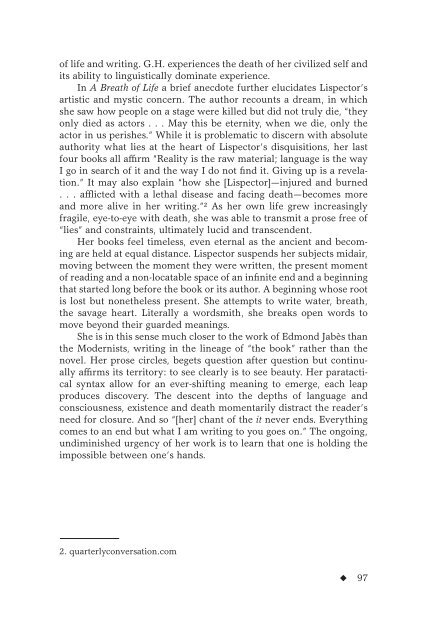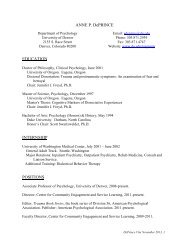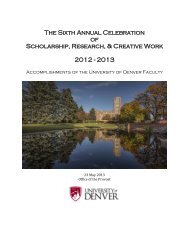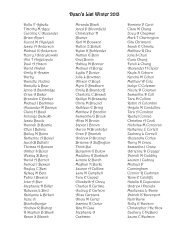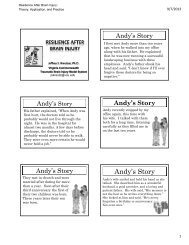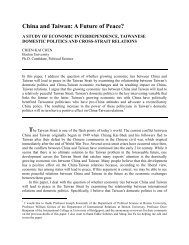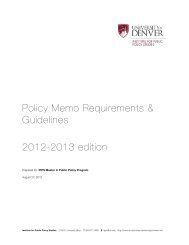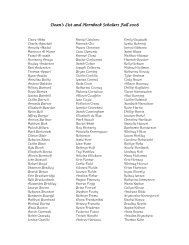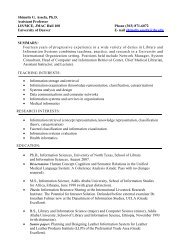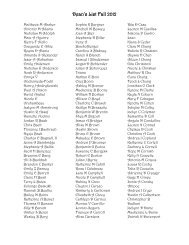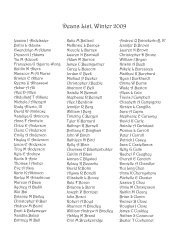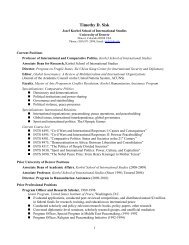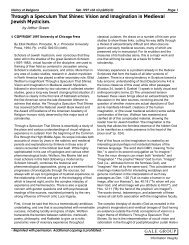The Law of the Living: On Clarice Lispector
The Law of the Living: On Clarice Lispector
The Law of the Living: On Clarice Lispector
You also want an ePaper? Increase the reach of your titles
YUMPU automatically turns print PDFs into web optimized ePapers that Google loves.
<strong>of</strong> life and writing. G.H. experiences <strong>the</strong> death <strong>of</strong> her civilized self and<br />
its ability to linguistically dominate experience.<br />
In A Breath <strong>of</strong> Life a brief anecdote fur<strong>the</strong>r elucidates <strong>Lispector</strong>’s<br />
artistic and mystic concern. <strong>The</strong> author recounts a dream, in which<br />
she saw how people on a stage were killed but did not truly die, “<strong>the</strong>y<br />
only died as actors . . . May this be eternity, when we die, only <strong>the</strong><br />
actor in us perishes.” While it is problematic to discern with absolute<br />
authority what lies at <strong>the</strong> heart <strong>of</strong> <strong>Lispector</strong>’s disquisitions, her last<br />
four books all affirm “Reality is <strong>the</strong> raw material; language is <strong>the</strong> way<br />
I go in search <strong>of</strong> it and <strong>the</strong> way I do not find it. Giving up is a revelation.”<br />
It may also explain “how she [<strong>Lispector</strong>]—injured and burned<br />
. . . afflicted with a lethal disease and facing death—becomes more<br />
and more alive in her writing.”² As her own life grew increasingly<br />
fragile, eye-to-eye with death, she was able to transmit a prose free <strong>of</strong><br />
“lies” and constraints, ultimately lucid and transcendent.<br />
Her books feel timeless, even eternal as <strong>the</strong> ancient and becoming<br />
are held at equal distance. <strong>Lispector</strong> suspends her subjects midair,<br />
moving between <strong>the</strong> moment <strong>the</strong>y were written, <strong>the</strong> present moment<br />
<strong>of</strong> reading and a non-locatable space <strong>of</strong> an infinite end and a beginning<br />
that started long before <strong>the</strong> book or its author. A beginning whose root<br />
is lost but none<strong>the</strong>less present. She attempts to write water, breath,<br />
<strong>the</strong> savage heart. Literally a wordsmith, she breaks open words to<br />
move beyond <strong>the</strong>ir guarded meanings.<br />
She is in this sense much closer to <strong>the</strong> work <strong>of</strong> Edmond Jabès than<br />
<strong>the</strong> Modernists, writing in <strong>the</strong> lineage <strong>of</strong> “<strong>the</strong> book” ra<strong>the</strong>r than <strong>the</strong><br />
novel. Her prose circles, begets question after question but continually<br />
affirms its territory: to see clearly is to see beauty. Her paratactical<br />
syntax allow for an ever-shifting meaning to emerge, each leap<br />
produces discovery. <strong>The</strong> descent into <strong>the</strong> depths <strong>of</strong> language and<br />
consciousness, existence and death momentarily distract <strong>the</strong> reader’s<br />
need for closure. And so “[her] chant <strong>of</strong> <strong>the</strong> it never ends. Everything<br />
comes to an end but what I am writing to you goes on.” <strong>The</strong> ongoing,<br />
undiminished urgency <strong>of</strong> her work is to learn that one is holding <strong>the</strong><br />
impossible between one’s hands.<br />
2. quarterlyconversation.com<br />
97


